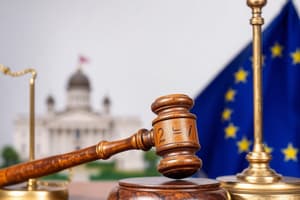Podcast
Questions and Answers
What distinguishes a regulation from a directive in EU law?
What distinguishes a regulation from a directive in EU law?
- Directives are directly applicable only under particular circumstances. (correct)
- Regulations require consent from member states before being applied.
- Regulations are binding in their entirety, while directives are binding only with respect to intended results. (correct)
- Regulations are only applicable to individual persons.
Which statement accurately reflects the principle of direct effect?
Which statement accurately reflects the principle of direct effect?
- Individuals can invoke provisions that have direct effect before courts under certain conditions. (correct)
- Direct effect applies to all European provisions without exception.
- Only Member States can invoke EU provisions before national courts.
- Individuals can invoke any EU provision at any time.
What does the term 'primacy of EU law' entail?
What does the term 'primacy of EU law' entail?
- EU law must be applied over any conflicting national provisions. (correct)
- EU provisions can be ignored if deemed conflicting by a national law.
- EU law should be re-evaluated with each national court case.
- National laws must always be upheld over EU regulations.
According to the Treaty on the European Union, what is required for a Member State to withdraw from the EU?
According to the Treaty on the European Union, what is required for a Member State to withdraw from the EU?
How does a decision differ from a directive in EU law?
How does a decision differ from a directive in EU law?
What role did Ireland play in the context of Brexit?
What role did Ireland play in the context of Brexit?
What is indicated by the term 'withdrawal' in relation to treaties?
What is indicated by the term 'withdrawal' in relation to treaties?
What is supplementary law in the context of EU law?
What is supplementary law in the context of EU law?
What is required for legal protection of a brand?
What is required for legal protection of a brand?
Which entity manages the European Union trade marks and registered Community designs?
Which entity manages the European Union trade marks and registered Community designs?
What distinguishes geographical indications from other IP protections?
What distinguishes geographical indications from other IP protections?
According to the Oslo Manual, what is the basic requirement for something to be considered an innovation?
According to the Oslo Manual, what is the basic requirement for something to be considered an innovation?
What is one of the aims of the TRIPS Agreement?
What is one of the aims of the TRIPS Agreement?
What is a characteristic of a perfectly competitive market?
What is a characteristic of a perfectly competitive market?
What is NOT a role of the European Observatory on Infringements of IPRs?
What is NOT a role of the European Observatory on Infringements of IPRs?
What leads to lower innovation rates in a perfectly competitive market?
What leads to lower innovation rates in a perfectly competitive market?
What principle requires that any advantage granted by a contracting party to another country should be accorded to all other contracting parties?
What principle requires that any advantage granted by a contracting party to another country should be accorded to all other contracting parties?
Which arrangement provides duty-free, quota-free access for all products except arms and ammunitions to the least developed countries?
Which arrangement provides duty-free, quota-free access for all products except arms and ammunitions to the least developed countries?
What does the term 'National treatment' refer to in the context of trade?
What does the term 'National treatment' refer to in the context of trade?
Which of the following is NOT a feature of the World Trade Organisation's principles against discrimination?
Which of the following is NOT a feature of the World Trade Organisation's principles against discrimination?
What does the Generalised Scheme of Preferences (GSP) primarily aim to achieve?
What does the Generalised Scheme of Preferences (GSP) primarily aim to achieve?
Which of the following best describes the EU-UK Trade and Cooperation Agreement signed in 2020?
Which of the following best describes the EU-UK Trade and Cooperation Agreement signed in 2020?
What is the role of the WTO’s dispute settlement body?
What is the role of the WTO’s dispute settlement body?
What characterizes the GSP+ arrangement in the European Union?
What characterizes the GSP+ arrangement in the European Union?
What is included in the expression 'literary and artistic works' according to the Berne Convention?
What is included in the expression 'literary and artistic works' according to the Berne Convention?
What does moral rights encompass for authors according to copyright law?
What does moral rights encompass for authors according to copyright law?
Which of the following accurately describes economic exploitation rights?
Which of the following accurately describes economic exploitation rights?
What is the primary objective of exceptions to copyrights?
What is the primary objective of exceptions to copyrights?
According to the Berne Convention, who is considered the author?
According to the Berne Convention, who is considered the author?
What is the role of a licensee in an intellectual property agreement?
What is the role of a licensee in an intellectual property agreement?
What issue did several member states face regarding copyright rules in the Digital Single Market?
What issue did several member states face regarding copyright rules in the Digital Single Market?
What aspect does the new copyright directive address?
What aspect does the new copyright directive address?
What types of information can trade secrets include?
What types of information can trade secrets include?
According to Article 1382 of the French Code Civil, what is a person required to do if they cause injury to another?
According to Article 1382 of the French Code Civil, what is a person required to do if they cause injury to another?
What was one of the main motivations behind the Statute of March, 1791 in France?
What was one of the main motivations behind the Statute of March, 1791 in France?
What is the concept of 'Achalandage' in the context of business?
What is the concept of 'Achalandage' in the context of business?
What does 'Concurrence Déloyale' refer to?
What does 'Concurrence Déloyale' refer to?
The concept of unfair competition is primarily defined as behavior that seeks what?
The concept of unfair competition is primarily defined as behavior that seeks what?
What was a key principle of the 1883 Paris Convention for the Protection of Intellectual Property?
What was a key principle of the 1883 Paris Convention for the Protection of Intellectual Property?
How is unfair competition perceived in the United States in relation to trademark law?
How is unfair competition perceived in the United States in relation to trademark law?
Which of the following conducts is prohibited under Australian Consumer Law Section 18?
Which of the following conducts is prohibited under Australian Consumer Law Section 18?
What does the Unfair Commercial Practices Directive (2005/29/EC) aim to regulate?
What does the Unfair Commercial Practices Directive (2005/29/EC) aim to regulate?
Which of the following is a requirement for lawful acquisition of trade secrets under the EU Directive 2016/943?
Which of the following is a requirement for lawful acquisition of trade secrets under the EU Directive 2016/943?
Which Act prohibits false representations about the characteristics of goods in the USA?
Which Act prohibits false representations about the characteristics of goods in the USA?
What does the Federal Trade Commission Act (Section 5(a)) declare unlawful?
What does the Federal Trade Commission Act (Section 5(a)) declare unlawful?
Which of the following is an example of an unfair business practice under the Australian Consumer Law?
Which of the following is an example of an unfair business practice under the Australian Consumer Law?
Under the EU Directive on the Protection of Undisclosed Trade Secrets, which practice is classified as lawful?
Under the EU Directive on the Protection of Undisclosed Trade Secrets, which practice is classified as lawful?
What is the primary focus of the Unfair Commercial Practices Directive in the EU?
What is the primary focus of the Unfair Commercial Practices Directive in the EU?
Flashcards
EU Regulations
EU Regulations
Legal acts addressing all Member States that are directly applicable and binding in their entirety.
EU Directives
EU Directives
Legal acts addressing all or specific Member States that are binding with respect to the intended result, but not directly applicable in all cases.
EU Decisions
EU Decisions
Legal acts addressing all or specific Member States or specific individuals that are directly applicable and binding in their entirety.
Supplementary EU Law
Supplementary EU Law
Signup and view all the flashcards
Primacy of EU Law
Primacy of EU Law
Signup and view all the flashcards
Direct Effect of EU Law
Direct Effect of EU Law
Signup and view all the flashcards
EU Withdrawal
EU Withdrawal
Signup and view all the flashcards
Brexit
Brexit
Signup and view all the flashcards
Free Trade Area
Free Trade Area
Signup and view all the flashcards
Customs Union
Customs Union
Signup and view all the flashcards
Economic Union
Economic Union
Signup and view all the flashcards
EU Bilateral Agreement
EU Bilateral Agreement
Signup and view all the flashcards
GSP+
GSP+
Signup and view all the flashcards
Everything But Arms (EBA)
Everything But Arms (EBA)
Signup and view all the flashcards
Most-Favored-Nation (MFN) Treatment
Most-Favored-Nation (MFN) Treatment
Signup and view all the flashcards
National Treatment
National Treatment
Signup and view all the flashcards
Originality in Copyright
Originality in Copyright
Signup and view all the flashcards
Authorship in Copyright
Authorship in Copyright
Signup and view all the flashcards
Economic Exploitation Rights
Economic Exploitation Rights
Signup and view all the flashcards
Moral Rights in Copyright
Moral Rights in Copyright
Signup and view all the flashcards
Exceptions to Copyright
Exceptions to Copyright
Signup and view all the flashcards
EU Copyright Directive (2019)
EU Copyright Directive (2019)
Signup and view all the flashcards
Derivative Works in Copyright
Derivative Works in Copyright
Signup and view all the flashcards
Copyright License
Copyright License
Signup and view all the flashcards
Brand protection
Brand protection
Signup and view all the flashcards
Geographical Indication (GI)
Geographical Indication (GI)
Signup and view all the flashcards
EUIPO (European Union Intellectual Property Office)
EUIPO (European Union Intellectual Property Office)
Signup and view all the flashcards
European Observatory on Infringements of IPRs
European Observatory on Infringements of IPRs
Signup and view all the flashcards
Innovation (Oslo Manual)
Innovation (Oslo Manual)
Signup and view all the flashcards
TRIPS Agreement
TRIPS Agreement
Signup and view all the flashcards
Perfectly competitive market
Perfectly competitive market
Signup and view all the flashcards
Exclusive market power and innovation
Exclusive market power and innovation
Signup and view all the flashcards
Unfair Competition
Unfair Competition
Signup and view all the flashcards
Dishonest Competition
Dishonest Competition
Signup and view all the flashcards
French Civil Code (Art. 1382)
French Civil Code (Art. 1382)
Signup and view all the flashcards
French Civil Code (Art. 1383)
French Civil Code (Art. 1383)
Signup and view all the flashcards
Propriété Industrielle (Industrial Property)
Propriété Industrielle (Industrial Property)
Signup and view all the flashcards
Achalandage
Achalandage
Signup and view all the flashcards
Concurrence Déloyale (Unfair Competition)
Concurrence Déloyale (Unfair Competition)
Signup and view all the flashcards
Freedom of Trade and Profession
Freedom of Trade and Profession
Signup and view all the flashcards
Australian Consumer Law (ACL) Sections 33 & 34
Australian Consumer Law (ACL) Sections 33 & 34
Signup and view all the flashcards
ACL Section 18
ACL Section 18
Signup and view all the flashcards
Unfair Commercial Practices Directive (2005/29/EC)
Unfair Commercial Practices Directive (2005/29/EC)
Signup and view all the flashcards
Uniform Deceptive Trade Practices Act
Uniform Deceptive Trade Practices Act
Signup and view all the flashcards
Federal Trade Commission Act (Section 5(a))
Federal Trade Commission Act (Section 5(a))
Signup and view all the flashcards
EU Directive on the Protection of Undisclosed Trade Secrets
EU Directive on the Protection of Undisclosed Trade Secrets
Signup and view all the flashcards
Lawful Acquisition of Trade Secrets
Lawful Acquisition of Trade Secrets
Signup and view all the flashcards
Lawful Use and Disclosure of Trade Secrets
Lawful Use and Disclosure of Trade Secrets
Signup and view all the flashcards
Study Notes
Business Law in the EU - Revision Sheets
- Unit 1: Introduction
- EU population in 2021 represents 5.7% of the global total, declining since 1970
- EU employment rate increased between 2010 and 2019 for both men and women
- EU's share of global GDP decreased between 2011 and 2021
- Services and industry comprise the majority of EU's Gross Value Added (GDP) in 2020
- EU government debt in 2021 was 87.9% of GDP
- EU's share of global trade in 2020 (exports 31.4%, imports 29.4%)
- EU's global GHG emissions represented 7.3% in 2019 and roughly 25% higher than the world average per capita
- Unit 2: International Law
- International law governs relations between states and international organisations
- Rules developed over time, both customary and treaty-based, covering various aspects of state-to-state relations
- Regional and international laws exist with varying scopes
- International Comity is widespread practice between states without legal obligation
- General international law applies to states, Universal when binding upon all, Regional binding only to some states, and Particular for only a few states
- Principles exist (Jus Cogens) which are fundamental to global community, and non-justiciable.
- Unit 3: EU Institutional and Legal Framework
- EU institutions: European Parliament, Council, Commission, HR/VP, European Council
- EU operates on a supranational basis with a dual-majority approach
- Institutions have responsibilities in legislative, budgetary and supervisory capacities
- EU institutions aim to improve and enforce EU laws, rules, and regulations
- Mergers and State aids are addressed through a process controlled and governed by the Commission
- Unit 4: Customs Union
- EU Customs Union is an exclusive competence
- EU trade law is primarily guided by WTO provisions, especially GATT
- It covers trade in goods and aims to facilitate global trade by removing barriers
- Harmonization and standardization facilitate cross-border trade among states
- Unit 5: EU Internal Market
- Internal Market aims to remove barriers between EU nations
- Free movement of: Goods, People, Services, and Capital
- Freedoms and responsibilities regarding services, workers' rights, and other related provisions
- Unit 6: Trade Policy: Trade Agreements
- Harmonisation of trade policies among EU members with a common external tariff
- Negotiations, consultations including taxes and agreements, among countries
- Procedures for agreements and international coordination
- Unit 7: Trade Policy: Trade Defence Instruments
- Trade defense instruments are used to address unfair trade practices (subsidies, dumping)
- WTO and EU regulations provide frameworks for anti-subsidy and anti-dumping measures
- Measures may be adopted in response to various trade-related factors
- Unit 8: Competition Policy: Antitrust
- EU competition policy aims to avoid distortions of competition and foster efficiency in Markets
- Actions include prohibiting anti-competitive agreements and abuse of dominant positions by companies
- Processes for handling complaints and investigations of potential infringements are outlined for relevant institutions
- Commission handles appeals and penalties against companies
- Competition policy aims to protect and foster the functioning markets within the EU
- Unit 9: Competition Policy: Mergers and State Aids
- EU controls mergers that could significantly affect competition
- Prohibition of State aid impacting competition in a substantial market
- Enforcement actions to address conflicts ensure fair market operations
- Unit 10: IPRs: Classification and Copyrights
-Intellectual property rights protect creative and innovative work
- Rules protect copyrights, trademarks, patents, and designs
- Unit 11: IPRs: Industrial Property and Distinctive Signs
- Intellectual Property Rights (IPRs) cover patents, industrial designs, and distinctive signs for products -Rights are granted and managed based on various statutes and levels
- Unit 12: Unfair Competition
- Code Civil (French Law) has a general principle of compensation for injuries
- Unfair practices are prohibited within trade and commerce
- Defining unfair competition entails assessing if trade practices violate agreed-upon principles
- Unit 13: Consumers Protection
- Consumer rights and protections are strengthened within the EU
- Rights and regulations relating to sales, guarantees and digital contracts apply
- Unit 14: Data Protection
- Data Protection Regulation (GDPR) implements strict rules for handling personal data
- Compliance and enforcement mechanisms are detailed for individuals and firms
Studying That Suits You
Use AI to generate personalized quizzes and flashcards to suit your learning preferences.
Related Documents
Description
This quiz explores key concepts in EU law, including the distinctions between regulations and directives, the principle of direct effect, and the implications of withdrawal from the EU. Test your knowledge on legal protections, innovations, and the role of the EU in trade and intellectual property.




